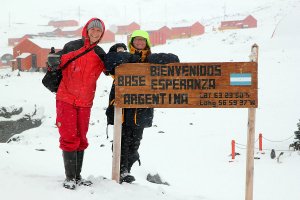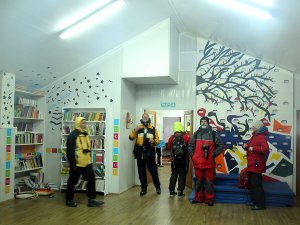Arto's Blog
| « Sunny whale watching on the Weddell Sea | Antarctic bathing » |
An Argentinian village on the Antarctic Peninsula
Posted: 2015-07-24 23:36:00, Categories: Travel, Argentina, Antarctica, Sailing, 638 words (permalink)From Deception Island our trip continued first slightly north to
Livingston Island and then south towards the Antarctic mainland.
There we visited the Argentinian base Esperanza, which was a small
village of red houses including a school for children.
Hannah Point on the Livingston Island was our last landing on the
South Shetland Islands. There, in addition to our daily dose of
penguins and seabirds, we got to observe elephant seals, big, fat and cool creatures lying on the beach. They were
moulting, which means renewing their skin, and during this period
the seals simply lie several weeks on the shore waiting for the old
skin to peel and the new one to grow. They don't move much, except
throwing some sand over themselves and socializing with each other.
The view, smell and sounds of a group of twenty elephant seals, each
weighing up to four tons, was impressive.
From the South Shetlands we headed South-East, and after half a day
and a night of sailing we arrived to the Antarctic Peninsula, the
northernmost part of the Antarctic mainland. Our next destination
was Esperanza, an Argentinian research and military base located at
Hope Bay, close to the tip of the peninsula. The visit was organized
so that we had a chance to see the base and the people at the base
got a tour at the ship — both parties were excited about the
opportunity.
Esperanza is one of the very few places in Antarctica which is not
only occupied by scientists but whole families, who even bring their
kids along. They spend generally one year at the base, including the
Antarctic winter. Then almost the whole staff changes and
new group of families comes for the next year. The site is led by the
Argentinian military, but the atmosphere was friendly and informal,
more like a village than a military base.
When we landed with our zodiacs at the shore, there were already
many eager locals, including probably all the children living
at the base, waiting for a ride to the ship. We helped them to put
on life vests and board the zodiacs, and then followed our
guide towards the group of about twenty red buildings. On the way we
saw the remains of an old stone hut built in 1902 by the members of
the Nordenskjöld expedition, nowadays inhabited by Gentoo penguins.
We visited the local museum, which presented the history of both
the base and the Nordenskjöld expedition, and the school which was
very cute and cozy. The tour ended at the village hall, a larger
space used for all bigger gatherings, also functioning as a post
office and a bar. We met some people living at the base, had a cup of
tea and sent post cards to our relatives and friends. The
communication possibilities included a mobile phone network,
allowing us to surprise a few people with sms messages from
Antarctica. Some even succeeded in checking emails using the
wireless Internet.
We spent one night anchored at Hope Bay, and I volunteered for one
of the two hour shifts of anchor watch. The tasks were to observe that
the ship won't start drifting (it does happen sometimes!) and that
no icebergs will be blown towards us by the wind. This time there was
only a slight wind and the sea was calm, no need to wake up the
captain. Outside on the deck I looked at the lights of the base and
thought of how it would be to live there, whereas the inhabitants
were probably watching our ship out of their windows and
wondering about sailing across the ocean.
No feedback yet

Copyright Arto Teräs <ajt@iki.fi>, licensed under the Creative Commons Attribution-Share Alike 3.0 Unported License. (Unless otherwise mentioned in individual photos or other content.)






